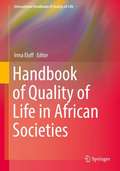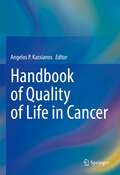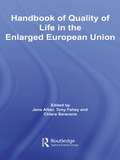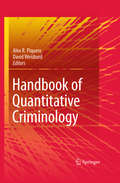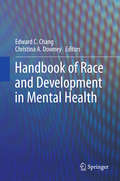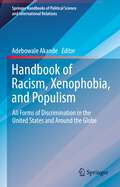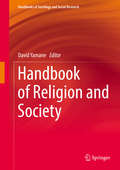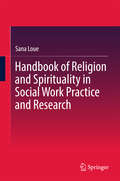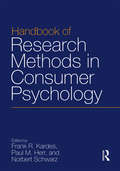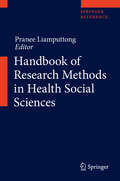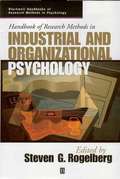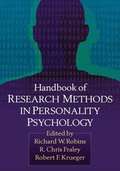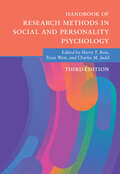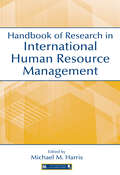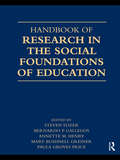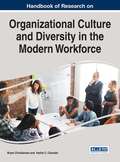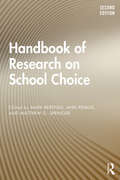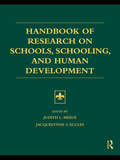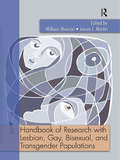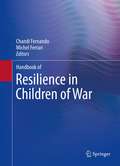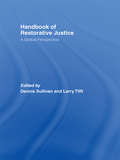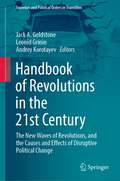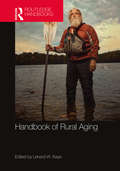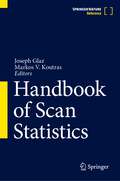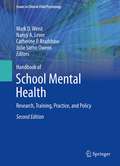- Table View
- List View
Handbook of Quality of Life in African Societies (International Handbooks of Quality-of-Life)
by Irma EloffThis handbook reflects on quality-of-life in societies on the continent of Africa. It provides a widely interdisciplinary text with insights on quality-of-life from a variety of scientific perspectives. The handbook is structured into sections covering themes of social context, culture and community; the environment and technology; health; education; and family. It is aimed at scholars who are working towards sustainable development at the intersections of multiple scientific fields and it provides measures of both objective and subjective quality-of-life. The scholarly contributions in the text are based on original research and it spans fields of research such as cultures of positivity, wellbeing, literacy and multilinguism, digital and mobile technologies, economic growth, food and nutrition, health promotion, community development, teacher education and family life. Some chapters take a broad approach and report on research findings involving thousands, and in one case millions, of participants. Other chapters zoom in and illustrate the importance of specificity in quality-of-life studies. Collectively, the handbook illuminates the particularity of quality-of-life in Africa, the unique contextual challenges and the resourcefulness with which challenges are being mediated. This handbook provides empirically grounded conceptualizations about life in Africa that also encapsulate the dynamic, ingenious ways in which we, as Africans, enhance our quality-of-life.
Handbook of Quality of Life in Cancer
by Angelos P. KassianosQuality of life is an important outcome when treating a cancer patient. Research is vast on the role of quality of life on patients' general wellbeing, responsiveness to treatment, and even mortality. On the other hand, there are several methodological considerations when planning to measure and assess quality of life in cancer patients. This handbook – with authorship that is diverse in terms of perspectives, countries, and fields – aims to fill a gap in the available literature and responds to a number of questions in its 26 chapters:What is quality of life and health-related quality of life and why are they important?How is quality of life assessed?What are the theoretical and methodological considerations when using quality of life outcomes in cancer research?How is quality of life useful in routine clinical care?How is quality of life impacting different cancer populations in terms of site of the cancer, age, gender, and context?Handbook of Quality of Life in Cancer is a learning and consulting tool that can be used by a diverse audience. It is an essential resource for researchers who wish to use quality of life assessment tools in clinical trials or other types of studies; clinicians who want to develop their understanding of how they can utilize quality of life and how it is important for the patients they care for; and commissioners who wish to see why quality of life may impact population health and health system costs. Students in diverse fields of study (medicine, nursing, psychology, social work, medical sociology, population health, epidemiology, and medical statistics, among others) also would benefit from using the handbook for their studies and for their continuing professional development.
Handbook of Quality of Life in the Enlarged European Union
by Chiara Saraceno Jens Alber Tony FaheyRecent enlargement to the east made the European Union a more diverse social space and brought it into more direct contact with the social and cultural aftermath of communism. The purpose of this book is to help social scientists, policy makers and other observers cope with the unfamiliarity of this new world by bringing together a collection of informative analyses of key domains of social life in the new member states and candidate countries, viewed in comparison both to each other and to the 'old' EU-15. The focus is on social conditions, such as social exclusion, poverty and living conditions, work and labour markets, family and housing. But is also offers accounts of the institutional contexts within which these conditions arise. The analyses makes use of a range of data, including a new data source, the European Quality of Life Survey 2003.
Handbook of Quantitative Criminology
by David Weisburd Alex R. PiqueroThe "Handbook of Quantitative Criminology" is designed to be the authoritative volume on methodological and statistical issues in the criminology/criminal justice field. Like handbooks available in other disciplines (economics, psychology, sociology), this book will be the go-to book for new and advanced methods in the field that will provide overviews of the issues, with examples and figures as warranted, for students, faculty, and researchers alike. Authored by leading scholars in criminology/criminal justice, the Handbook contains 24 chapters on topics in the following key areas: (1) research design, (2) experimental methods, (3) methods for overcoming data limitations, (4) innovative descriptive methods, (5) estimation techniques for theory and policy, (6) topics in multiple regression, and (7) new directions in statistical analysis.
Handbook of Race and Development in Mental Health
by Edward Chang Christina A. DowneyThis project is unique in the field for a number of reasons, both in structure and in content. Specifically, it will have leading experts on specific age groups (Childhood to Adolescence, Young Adulthood to Middle Age, and The Elderly) within the cultural groups of interest (European-Americans, African-Americans, Asian-Americans, Hispanic-Americans, and Native Americans) contribute a chapter covering current research on both positive and negative functioning for each population. Each chapter will present basic demographic information, strengths that contribute to resilience, and three significant challenges each group faces to maintaining mental health. Each chapter will then include an integrative section, where ideas are advanced about how the strengths of each group can be harnessed to address the challenges that group faces. To conclude, each chapter will propose future directions for research which addresses integrative approaches to mental health for each group, and the implications that such approaches could have for future treatment. The main points of each section of each chapter will be visually summarized in a concluding table.
Handbook of Racism, Xenophobia, and Populism: All Forms of Discrimination in the United States and Around the Globe (Springer Handbooks of Political Science and International Relations)
by Adebowale AkandeThis handbook presents the roots of symbolic racism as partly in both anti-black antagonism and non-racial conservative attitudes and values, representing a new form of racism independent of older racial and political attitudes. By doing so, it homes in on certain historical incidents and episodes and presents a cogent analysis of anti-black, Jim Crowism, anti-people of color (Black, Latino, Native Americans), and prejudice that exists in the United States and around the world as a central tenet of racism. The book exposes the reader to the nature and practice of stereotyping, negative bias, social categorization, modern forms of racism, immigration law empowerment, racialized incarceration, and police brutality in the American heartland. It states that several centuries of white Americans’ negative socializing culture marked by widespread negative attitudes toward African Americans, are not eradicated and are still rife. Further, the book provides a panoramic view of trends of racial discrimination and other negative and desperate challenges that Black, Indigenous, and People of Color face across the world. Finally, the volume examines xenophobia, racism, prejudice, and stereotyping in different contexts, including topics such as Covid-19, religion and racism, information manipulation, and populism. The book, therefore, is a must-read for students, researchers, and scholars of political science, psychology, history, sociology, communications/media studies, diplomatic studies, and law in general, as well as ethnic and racial studies, American politics, global affairs, populism, and discrimination in particular.
Handbook of Religion and Society
by David YamaneThe Handbook of Religion and Society is the most comprehensive and up-to-date treatment of a vital force in the world today. It is an indispensable resource for scholars, students, policy makers, and other professionals seeking to understand the role of religion in society. This includes both the social forces that shape religion and the social consequences of religion. This handbook captures the breadth and depth of contemporary work in the field, and shows readers important future directions for scholarship. Among the emerging topics covered in the handbook are biological functioning, organizational innovation, digital religion, spirituality, atheism, and transnationalism. The relationship of religion to other significant social institutions like work and entrepreneurship, science, and sport is also analyzed. Specific attention is paid, where appropriate, to international issues as well as to race, class, sexuality, and gender differences. This handbook includes 27 chapters by a distinguished, diverse, and international collection of experts, organized into 6 major sections: religion and social institutions; religious organization; family, life course, and individual change; difference and inequality; political and legal processes; and globalization and transnationalism.
Handbook of Religion and Spirituality in Social Work Practice and Research
by Sana LoueThis singular reference explores religion and spirituality as a vital, though often misconstrued, lens for building better understanding of and empathy with clients. A diverse palette of faiths and traditions is compared and contrasted (occasionally with secularism), focusing on areas of belief that may inspire, comfort, or trouble clients, including health and illness, mental illness, healing, coping, forgiveness, family, inclusion, and death. From assessment and intervention planning to conducting research, these chapters guide professionals in supporting and assisting clients without minimizing or overstating their beliefs. In addition, the book's progression of ideas takes readers beyond the well-known concept of cultural competence to model a larger and more meaningful cultural safety. Among the topics included in the Handbook: Integrating religion and spirituality into social work practice. Cultural humility, cultural safety, and beyond: new understandings and implications for social work. Healing traditions, religion/spirituality, and health. Diagnosis: religious/spiritual experience or mental illness? Understandings of dying, death, and mourning. (Re)building bridges in and with family and community. Ethical issues in conducting research on religion and spirituality. The Handbook of Religion and Spirituality in Social Work Practice and Research is a richly-textured resource for social workers and mental health professionals engaged in clinical practice and/or research seeking to gain varied perspectives on how the religion and spirituality of their clients/research participants may inform their work.
Handbook of Research Methods in Consumer Psychology
by Norbert Schwarz Frank R. Kardes Paul P. HerrWhat impact can various research methods have on consumer psychology? How can they help us understand the workings of the consumer mind? And how can the field of consumer psychology best utilize these methods? In the Handbook of Research Methods in Consumer Psychology, leading consumer psychologists summarize key aspects of the research process and explain how different methods enrich understanding of how consumers process information to form judgments and opinions and to make consumption-related decisions. Kardes, Herr, and Schwarz provide an in-depth analysis of the scientific research methods needed to understand consumption-related judgments and decisions. The book is split into five parts, demonstrating the breadth of the volume: classic approaches, contemporary approaches, online research methods, data analysis, and philosophy of science. A variety of leading researchers give insight into a wide range of topics, reflecting both long-standing debate and more recent developments in the field to encourage discussion and the advancement of consumer research. The Handbook of Research Methods in Consumer Psychology is essential reading for researchers, students, and professionals interested in consumer psychology and behavior.
Handbook of Research Methods in Health Social Sciences
by Pranee LiamputtongResearch is defined by the Australian Research Council as “the creation of new knowledge and/or the use of existing knowledge in a new and creative way so as to generate new concepts, methodologies, inventions and understandings”. Research is thus the foundation for knowledge. It produces evidence and informs actions that can provide wider benefit to a society. The knowledge that researchers cultivate from a piece of research can be adopted for social and health programs that can improve the health and well-being of the individuals, their communities and the societies in which they live. As we have witnessed in all corners of the globe, research has become an endeavor that most of us in the health and social sciences cannot avoid. This Handbook is conceived to provide the foundation to readers who wish to embark on a research project in order to form knowledge that they need. The Handbook comprises four main sections: Traditional research methods sciences; Innovative research methods; Doing cross-cultural research; and Sensitive research methodology and approach. This Handbook attests to the diversity and richness of research methods in the health and social sciences. It will benefit many readers, particularly students and researchers who undertake research in health and social science areas. It is also valuable for the training needs of postgraduate students who wish to undertake research in cross-cultural settings, with special groups of people, as it provides essential knowledge not only on the methods of data collection but also salient issues that they need to know if they wish to succeed in their research endeavors.
Handbook of Research Methods in Industrial and Organizational Psychology (Blackwell Handbooks of Research Methods in Psychology #8)
by Steven G. RogelbergHandbook of Research Methods in Industrial and Organizational Psychology is a comprehensive and contemporary treatment of research philosophies, approaches, tools, and techniques indigenous to industrial and organizational psychology. Only available research handbook for Industrial & Organizational Psychology. Contributors are leading methodological & measurement scholars. Excellent balance of practical and theoretical insights which will be of interest to both novice and experienced organizational researchers. Great companion to the content-oriented Handbooks. Now available in full text online via xreferplus, the award-winning reference library on the web from xrefer. For more information, visit www.xreferplus.com
Handbook of Research Methods in Personality Psychology
by Richard Robins R. Chris FraleyBringing together leading investigators, this comprehensive handbook is a one-stop reference for anyone planning or conducting research on personality. It provides up-to-date analyses of the rich array of methodological tools available today, giving particular attention to real-world theoretical and logistical challenges and how to overcome them. In chapters filled with detailed, practical examples, readers are shown step by step how to formulate a suitable research design, select and use high-quality measures, and manage the complexities of data analysis and interpretation. Coverage ranges from classic methods like self-report inventories and observational procedures to such recent innovations as neuroimaging and genetic analyses.
Handbook of Research Methods in Social and Personality Psychology (Cambridge Handbooks in Psychology)
by Charles M. Judd Harry T. Reis Tessa WestThis indispensable collection provides extensive, yet accessible, coverage of conceptual and practical issues in research design in personality and social psychology. Using numerous examples and clear guidelines, especially for conducting complex statistical analysis, leading experts address specific methods and areas of research to capture a definitive overview of contemporary practice. Updated and expanded, this third edition engages with the most important methodological innovations over the past decade, offering a timely perspective on research practice in the field. To reflect such rapid advances, this volume includes commentary on particularly timely areas of development such as social neuroscience, mobile sensing methods, and innovative statistical applications. Seasoned and early-career researchers alike will find a range of tools, methods, and practices that will help improve their research and develop new conceptual and methodological possibilities. Supplementary online materials are available on Cambridge Core.
Handbook of Research in International Human Resource Management (Organization And Management Ser.)
by Michael M. HarrisHandbook of Research in International Human Resource Management, a book in LEA‘s Organization and Management Series, provides a sophisticated, in-depth examination of research in international human resource management (IHRM). Editor Michael M. Harris compiles research in IHRM that is otherwise fragmented across numerous journals and conducted from
Handbook of Research in the Social Foundations of Education
by Steven E. TozerParts one and two of this volume present the theoretical lenses used to study the social contexts of education. These include long-established foundations disciplines such as sociology of education and philosophy of education as well as newer theoretical perspectives such as critical race theory, feminist educational theory, and cultural studies in education. Parts three, four, and five demonstrate how these theoretical lenses are used to examine such phenomena as globalization, media, popular culture, technology, youth culture, and schooling. This groundbreaking volume helps readers understand the history, evolution, and significance of this wide-ranging, often misunderstood, and increasingly important field of study. This book is appropriate as a reference volume not only for scholars in the social foundations of education but also for scholars interested in the cultural contexts of teaching and learning (formal and informal). It is also appropriate as a textbook for graduate-level courses in Social Foundations of Education, School and Society, Educational Policy Studies, Cultural Studies in Education, and Curriculum and Instruction.
Handbook of Research on Organizational Culture and Diversity in the Modern Workforce
by Bryan Christiansen Harish C. ChandanIn today's globalized economy, an understanding of organizational culture and diversity in the modern workforce is crucial to increasing corporate productivity and profit. This publication provides useful reference material for business and government executives, researchers, and undergraduate/graduate students for guidance in the areas of human resource management, occupational health, and well-being at work including work-life balance and firm performance. <p><p> Insights into relative perspectives in culture theories such as the Gothberg IV Model and Hofstede's Model are presented in cross-cultural industrial settings. Qualitative methods in organizational and industrial psychology research are discussed. The latest research on sexual harassment in digital environments, managerial bullying, incivility at work and organizational diversity including inclusion of people with disabilities is presented. <p> Recent research on work-related micro organizational behavior human factors, cynical individual factor, employee empowerment and organizational cynicism, and organizational justice is presented. Leadership traits and active listening and emotional intelligence at work are discussed. Business and industrial organizations can use these articles for guidance in the areas of talent retention and development and international assignments.
Handbook of Research on School Choice
Updated to reflect the latest developments and increasing scope of school-based options, the second edition of the Handbook of Research on School Choice makes readily available the most rigorous and policy-relevant research on K–12 school choice. This comprehensive research handbook begins with scholarly overviews that explore historical, political, economic, legal, methodological, and international perspectives on school choice. In the following sections, experts examine the research and current state of common forms of school choice: charter schools, school vouchers, and magnet schools. The concluding section brings together perspectives on other key topics such as accountability, tax credit scholarships, parent decision-making, and marginalized students. With empirical perspectives on all aspects of this evolving sphere of education, this is a critical resource for researchers, faculty, and students interested in education policy, the politics of education, and educational leadership.
Handbook of Research on Schools, Schooling and Human Development
by Judith L. MeeceChildren spend more time in school than in any social institution outside the home. And schools probably exert more influence on children’s development and life chances than any environment beyond the home and neighbourhood. The purpose of this book is to document some important ways schools influence children’s development and to describe various models and methods for studying schooling effects. Key features include: Comprehensive Coverage – this is the first book to provide a comprehensive review of what is known about schools as a context for human development. Topical coverage ranges from theoretical foundations to investigative methodologies and from classroom-level influences such as teacher-student relations to broader influences such as school organization and educational policies. Cross-Disciplinary – this volume brings together the divergent perspectives, methods and findings of scholars from a variety of disciplines, among them educational psychology, developmental psychology, school psychology, social psychology, psychiatry, sociology, and educational policy. Chapter Structure – to ensure continuity, chapter authors describe 1) how schooling influences are conceptualized 2) identify their theoretical and methodological approaches 3) discuss the strengths and weaknesses of existing research and 4) highlight implications for future research, practice, and policy. Methodologies – chapters included in the text feature various methodologies including longitudinal studies, hierarchical linear models, experimental and quasi-experimental designs, and mixed methods.
Handbook of Research with Lesbian, Gay, Bisexual, and Transgender Populations
by William Meezan James I. MartinHandbook of Research with Lesbian, Gay, Bisexual, and Transgender Populations provides a detailed examination of the current methods and theoretical frameworks for conducting research with LGBT populations. Introducing greater nuance in designing and implementing research models for working with these populations, Handbook of Research with Lesbian, Gay, Bisexual, and Transgender Populations provides guidelines for defining these groups, strategies to obtain more inclusive and representative samples, and methods for engaging these populations to produce consistent and relevant data. Collecting essays by notable researchers and scholars in the field, Handbook of Research with Lesbian, Gay, Bisexual, and Transgender Populations provides meaningful analyses of the ethics and practical constraints that researchers confront in dealing with LGBT populations--including protection of privacy--which is a special concern for many. For students, teachers, social workers, mental health professionals, and researchers of all backgrounds, this is an invaluable resource and guidebook for anyone seeking a better quality of understanding and engagement with LGBT individuals and communities.
Handbook of Resilience in Children of War
by Michel Ferrari Chandi FernandoTheir frightened, angry faces are grim reminders of the reach of war. They are millions of children, orphaned, displaced, forced to flee or to fight. And just as they have myriad possibilities for trauma, their lives also hold great potential for recovery. The Handbook of Resilience in Children of War explores these critical phenomena at the theoretical, research, and treatment levels, beginning with the psychosocial effects of exposure to war. Narratives of young people's lives in war zones as diverse as Afghanistan, Sri Lanka, Columbia, and Sudan reveal the complexities of their experiences and the meanings they attach to them, providing valuable keys to their rehabilitation. Other chapters identify strengths and limitations of current interventions, and of constructs of resilience as applied to youth affected by war. Throughout this cutting-edge volume, the emphasis is on improving the field through more relevant research and accurate, evidence-based interventions, in such areas as: An ecological resilience approach to promoting mental health in children of war.Child soldiers and the myth of the ticking time bomb.The Child Friendly Spaces postwar intervention program.The role of education for war-zone immigrant and refugee students.Political violence, identity, and adjustment in children.The Handbook of Resilience in Children of War is essential reading for researchers, scientist-practitioners, and graduate students in diverse fields including clinical child, school, and developmental psychology; child and adolescent psychiatry; social work; counseling; education; and allied medical and public health disciplines.
Handbook of Restorative Justice: A Global Perspective
by Dennis Sullivan Larry TifftHandbook of Restorative Justice is a collection of original, cutting-edge essays that offer an insightful and critical assessment of the theory, principles and practices of restorative justice around the globe. This much-awaited volume is a response to the cry of students, scholars and practitioners of restorative justice, for a comprehensive resource about a practice that is radically transforming the way the human community responds to loss, trauma and harm. Its diverse essays not only explore the various methods of responding nonviolently to harms-done by persons, groups, global corporations and nation-states, but also examine the dimensions of restorative justice in relation to criminology, victimology, traumatology and feminist studies. In addition. They contain prescriptions for how communities might re-structure their family, school and workplace life according to restorative values. This Handbook is an essential tool for every serious student of criminal, social and restorative justice.
Handbook of Revolutions in the 21st Century: The New Waves of Revolutions, and the Causes and Effects of Disruptive Political Change (Societies and Political Orders in Transition)
by Jack A. Goldstone Leonid Grinin Andrey KorotayevThe 21st century has witnessed a considerable and increasing number of political revolutions around the world. This contradicts the popular belief of many experts in the 1970s that revolutions occurred mainly in monarchies and empires. Instead, the revolutions of this century have several new characteristics, which call for a renewed analysis of the subject.This handbook offers a comparative perspective on the new wave of revolutions of the last decade. Presenting case studies on the color revolutions, the Arab revolutions of 2010–2011, and the global wave of revolutions in 2013–2018 that spanned regions ranging from Africa to the Caucasus, it offers a better understanding of the varied forms, features, and historical backgrounds of revolutions, as well as their causes. Accordingly, it highlights recent revolutions in their historical and world-systems contexts.The handbook is divided into seven parts, the first of which examines the history of views on revolution and important aspects of the theory of revolution. The second part analyzes revolutions within long-term historical trends and in their world-system contexts. In turn, the third part explores specific major revolutionary waves in history. The fourth part analyzes the first revolutionary wave of the 21st century (2000–2009), the so-called color revolutions, while the fifth discusses the second wave – the Arab Spring (2010–2013) – as an important turning point. The sixth part is dedicated to analyzing revolutions and revolutionary movements beyond the Arab Spring and some revolutionary events from the third wave that began in 2018. The seventh and final part offers forecasts on the future of revolutions. Given its scope, the book will appeal to scholars and students from various disciplines interested in historical trends, sociopolitical change, contentious politics, social movements, and revolutionary processes involving both nonviolent campaigns and political violence. "Once again, this volume demonstrates the kind of open-minded, systematic analysis that the field of revolutionary studies requires." (Prof. George Lawson, Department of International Relations, Australian National University Canberra)
Handbook of Rural Aging
by Lenard W. KayeThe Handbook of Rural Aging goes beyond the perspective of a narrow range of health professions, disciplines, and community services that serve older adults in rural America to encompass the full range of perspectives and issues impacting the communities in which rural older adults live. Touching on such topics as work and voluntarism, technology, transportation, housing, the environment, social participation, and the delivery of health and community services, this reference work addresses the full breadth and scope of factors impacting the lives of rural elders with contributions from recognized scholars, administrators, and researchers. This Handbook buttresses a widespread movement to garner more attention for rural America in policy matters and decisions, while also elevating awareness of the critical circumstances facing rural elders and those who serve them.Merging demographic, economic, social, cultural, health, environmental, and political perspectives, it will be an essential reference source for library professionals, researchers, educators, students, program and community administrators, and practitioners with a combined interest in rural issues and aging.
Handbook of Scan Statistics
by Joseph Glaz Markos V. KoutrasScan statistics, one of the most active research areas in applied probability and statistics, has seen a tremendous growth during the last 25 years. Google Scholar lists about 3,500 hits to references of articles on scan statistics since the year 2020, resulting in over 850 hits to articles per year. This is mainly due to extensive and diverse areas of science and technology where scan statistics have been employed, including: atmospheric and climate sciences, business, computer science, criminology, ecology, epidemiology, finance, genetics and genomics, geographic sciences, medical and health sciences, nutrition, pharmaceutical sciences, physics, quality control and reliability, social networks and veterinary science. This volume of the Handbook of Scan Statistics is a collection of forty chapters, authored by leading experts in the field, outlines the research and the breadthof applications of scan statistics to the numerous areas of science and technology listed above. These chapters present an overview of the theory, methods and computational techniques, related to research in the area of scan statistics and outline future developments. It contains extensive references to research articles, books and relevant computer software. Handbook of Scan Statistics is an excellent reference for researchers and graduate students in applied probability and statistics, as well as for scientists in research areas where scan statistics are used. This volume may also be used as a textbook for a graduate level course on scan statistics.
Handbook of School Mental Health: Research, Training, Practice, and Policy
by Mark D. Weist Julie Sarno Owens Catherine Bradshaw Nancy A. LeverWith so few therapeutic outlets readily available to young people, schools have evolved into mental health centers for many students. Yet schools are hampered by limited access to resources needed to provide mental health promotion, prevention, and intervention services. Like its acclaimed predecessor, the Second Edition of the Handbook of School Mental Health offers ways for professionals to maximize resources, make and strengthen valuable connections, and attain more effective school-based services and programming. At the same time, the Handbook provides strategies and recommendations in critical areas, such as workforce development, interdisciplinary collaborations, youth/family engagement, consultation, funding, and policy concerns, summarizes the state of current research, and offers directions for further study. Chapters model best practices for promoting wellness and safety, early detection of emotional and behavioral problems, and school-based interventions for students with anxiety, depression, attention deficit hyperactivity disorder, and other common challenges. In spotlighting this range of issues, the contributors have created a comprehensive game plan for advancing the field. Among the Handbook's topics: Pre-service training for school mental health clinicians.Cognitive-behavioral interventions for trauma in schools. Increasing parental engagement in school-based interventions.Models of psychiatric consultation to schools.Culturally competent behavioral and emotional screening. Bullying from a school mental health perspective.Prevention and intervention strategies related to a variety of mental health problems in schools. The Second Edition of the Handbook of School Mental Health is an essential reference for researchers, graduate students, and other professionals in child and school psychology, special and general education, public health, school nursing, occupational therapy, psychiatry, social work and counseling, educational policy, and family advocacy.
